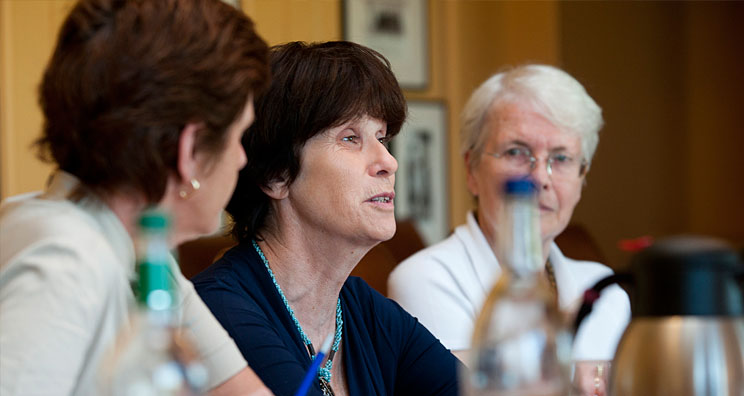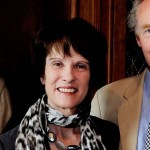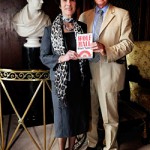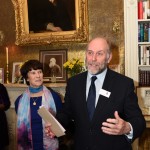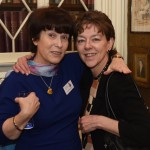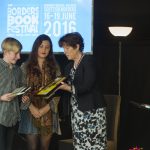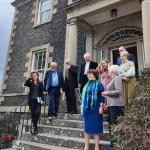The Duchess of Buccleuch
12th May, 2023
The Walter Scott and Young Walter Scott Prizes were deeply saddened to announce the death on 30th April of their patron and co-founder, the Duchess of Buccleuch, known as Bizza to everyone in the wider Prize family.
Katie Grant, chair of the judges of the Walter Scott Prize, said: “Historical fiction has lost a great champion and a generous patron. As co-founder, with the Duke, of the Walter Scott Prize for Historical Fiction, Bizza Buccleuch enhanced the whole genre, boosting and rewarding the creative energies of both emerging and established authors. Her enthusiasm has powered the prize, and her insights have brought to public attention books that might otherwise have been overlooked. Together with all historical novelists, we, her fellow judges on the Walter Scott Prize panel, will feel her loss intensely.”
Lindsey Fraser, administrator of the Young Walter Scott Prize, said: “The Duchess of Buccleuch was passionate about the Young Walter Scott Prize, always interested in and delighted by the entries. She founded it because she believed in the value of young people exploring history through their own creative writing. And its success has proved her point. We’ll so miss Bizza’s lively contributions, her wise and often witty insights, and her loving support for the work of the Prize.”
It was the Duke and Duchess’ vision in 2008 to recognise Sir Walter Scott’s literary and other gifts “through the medium of a substantial prize for outstanding writing which vividly records and brings to life the past, as he did”. The inaugural Walter Scott Prize was awarded to Hilary Mantel’s Wolf Hall by the Duke and Duchess at Abbotsford, Scott’s Borders home, but the prizegiving moved in subsequent years to the marquees of the Borders Book Festival in the gardens of Harmony House in Melrose. Almost uniquely amongst book awards, the Prize is awarded not at a formal dinner but in a joyful public celebration of words and books – the idea of Borders Book Festival director Alistair Moffat, which was wholeheartedly embraced by the Duchess.
Also uniquely, the Prize judging panel does not alter every year but is made up of a core team, with panel members changing from time to time to keep a fresh perspective. At the heart of that core team was Bizza. A judge from the Prize’s inception, she never gave herself special privileges on the panel, preferring the collegiate approach, and often changing her mind about a book after hearing a new take on it from a fellow judge.
She took her duties as a judge extremely seriously, scouring review pages and book lists throughout the year to discover hidden gems, which she would put forward for ‘calling in’. Her talent for spotting books which advance the cutting edge of historical fiction led to many discoveries which now have greater public recognition, among them Benjamin Myers who describes his 2018 win with The Gallows Pole, now a major BBC TV series, as “life changing”.
In 2012 it was Bizza’s idea to add the ‘Commonwealth rule’, allowing books published in English in Commonwealth countries to be eligible. This enriched the prize longlists and shortlists with culturally diverse and important historical stories from countries including Australia, Canada and India. She developed a special bond with Malaysian-born Tan Twan Eng, the Prize’s 2012 winner with The Garden of Evening Mists; indeed they met up again just months before her death.
In 2015 the Prize’s fifth birthday was celebrated with a reception at the historic offices of Scott and Byron’s publishers, John Murray. Bizza was there alongside prizewinners past and present and a host of literary luminaries.
Also in 2015, the Duchess launched a new prize for young writers of historical fiction, the Young Walter Scott Prize. Entirely her own concept, the YWSP was designed to encourage the historical novelists of the future via a short story writing competition for young people aged between 11 and 19, with two prizewinners awarded a research travel grant, an invitation to the Borders Book Festival, and the opportunity to have their work published in a special YWSP anthology. Bizza invited Tan Twan Eng to be the YWSP Patron.
She took an active role new prize, reading the YWSP submissions and adding a workshop dimension to the Prize through the creation of the Imagining History activities programme, run by YWSP director Alan Caig Wilson. Since its inception, the YWSP has seen entries increase 6-fold, and Bizza was thrilled to learn that some of its early winners were already beginning to develop promising writing careers, with the experience of the YWSP as rocket fuel.
The hospitality of the Duke and Duchess at the prizegiving events every June is legendary, with all the Walter Scott Prize shortlisted authors invited to stay as their guests at Bowhill, the Buccleuch Borders home near Abbotsford and the Book Festival site. There, authors, judges and other guests mingle and chat, often long into the night – “it’s how prizes, which are so important to authors, must be run” reflected 2019 winner Robin Robertson.
But the impact of Prize runs deeper than a cheque and a prize-giving. As twice-winner of the Prize, Sebastian Barry, shrewdly observed, this is “a prize that does its strange work so well that it may be considered not just passively to honour historical fiction, but to be having an effect on it at DNA level. It digs and nurtures the seed bed.” Hilary Mantel, another double-winner, praised the Duke and Duchess not only for their far-sighted generosity, but also for Prize as a “great encouragement to my fellow writers” and a “a source of great pleasure to the reading public”.
This is the Duchess’ legacy, along with all her unseen kindnesses and acts of support for writers and book-lovers everywhere. We will miss her very much.
- Duke and Duchess of Buccleuch at Abbotsford, Scott’s home
- The inaugural Walter Scott Prize in 2010 at Abbotsford: L to R: Alistair Moffat, Duke of Buccleuch, James Naughtie, Duchess of Buccleuch, Tam Dalyell
- Duke and Duchess with inaugural prizewinning book Wolf Hall
- 2016 Prize jury – L to R: James Naughtie, Jackie Kay, Duchess of Buccleuch
- Duchess of Buccleuch with fellow judges Louise Richardson (L) and Elizabeth Laird (R)
- 2018 Prize jury – L to R: Kate Figes, chair Katie Grant, Kirsty Wark, Duchess of Buccleuch
- 2018 Walter Scott Prize winner Benjamin Myers
- Duchess at the Prize’s 5th birthday, with chair Alistair Moffat
- Duchess of Buccleuch and Anna Swan at the Prize’s 5th birthday party
- Duchess of Buccleuch presents 2016 YWSP winners Joe Bradley and Rosi Byard-Jones
- Dame Hilary Mantel meets 2020 YWSP winners
- Duchess of Buccleuch with 2022 judges and shortlisted authors

